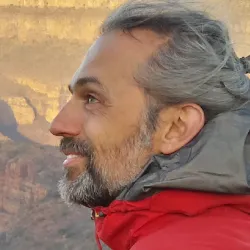Professor Jochen J. Brocks

Content navigation
Affiliations
- Geochemistry, Member
- Brocks Geobiology, Researcher
Research interests
Jochen J. Brocks is a professor at the Research School of Earth Sciences at the Australian National University. He received a Masters in physical organic chemistry from the University of Freiburg in Germany and a PhD from the University of Sydney, Australia in 2002. He was a Junior Fellow of the Harvard Society of Fellows from 2001 to 2004. He calls his field of research ‘Paleobiogeochemistry' as he is fascinated by biological processes in deep time, from the origin of life to mysterious ecosystems in Earth's earliest oceans, and events that may have spawned the evolution of complex cells and multicellular life. To find clues about ancient ecosystems, he studies molecular fossils of biological lipids (biomarkers) that can be preserved in sedimentary rocks for billions of years. Currently he and his students investigate the question why large, multicellular and active creatures appeared on Earth some 600 million years ago, how primary producers at the base of the foodweb controlled the largest mass extinction of all times, and whether ancient oceans harbored a lost world of complex life that left no traces … apart from some obsolete molecules.
Projects
- The biogeochemistry of a Salt Lake, Principal investigator
- Origins of organisms, organic-rich rocks and oils: mapping the evolution of algal and cyanobacterial communities in Australian onshore sedimentary basins, Supervisor
- Palaeobiology / Geobiology, Supervisor
- Precambrian sedimentary rocks in northern Australia: a window into the early history of life on Earth, Supervisor
Teaching information
EMSC 2019 Palaeontology and Geobiology
Location
J1
